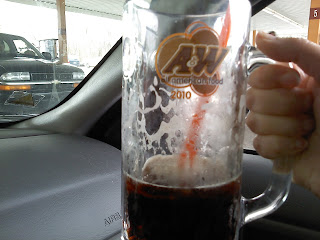I'm currently teaching four classes for junior high/high school students. One is a class on leadership. As a part of the weekly lesson, I interview a leader and share his or her insight with the group.
This strategy came out of a very short preparation window: I didn't have a lot of time to read and research using traditional methods, but I do know some amazing people. I chased a couple of them around for an hour or two. I learned more from that conversation than I could've learned from reading an entire book. The students seemed to enjoy the real-world connection, so I've kept this interview portion of class as a weekly thing.
I've discovered that a couple of these students are musicians. They are thinking about their future; they're dreaming big. To give them some perspective on the music industry, I asked Asa Lane, all-around cool cat and drummer for the Jason Eaton Band, to be my first formal, in-writing, interviewee for my class. I've known Asa for a while, and have always been impressed by his intensity and discipline.
When asked to help my students, Asa said yes. I liked his answers so much that I wanted to publish them. He kindly agreed.
How have you approached your musical career?
Asa: I've approached it with the positive attitude that I will absolutely be making my livelyhood making and performing music. You must have that in your head no matter what "seems" "normal". Forget the traditions, the family job, the army, the desk job, etc. If you were born to play music, you must give it your best effort with the reinforcement that you WILL be successful in it. Many other things go into that though besides thinking it (practice, connections, etc.)
Describe your training in music.
Asa: My "official" training included my last 2 years of marching/concert/jazz band in high school. I started playing drums when I was 11, and have had 2 unofficial drum lessons from insane pros in my life totaling about 45 minutes worth of lesson time. I still use things learned from them to this day, and will continue to use and teach them!
What kind of schedule do you follow for personal growth? How disciplined do you have to be?
Asa: PRACTICE. PRACTICE. PRACTICE. Seriously, practice as often and as hard as possible. If it's not music then STUDY or TRAIN or whatever it is you have to do to set yourself far above the rest. Great lawyers wouldn't cut making the OJ trial, the exceptional lawyers who have true passion for their art do. You can accomplish this by finding out what the status quo is, and then multiplying that by 10, 100, or 1000. It's up to you. An exceptional drummer once stated that it's better to practice 20 minutes a day, rather than 4 hours once a week. It'll keep you fluid in both physical and mental memory with what you're rehearsing/building upon. Remember that in all things.
You have to be as disciplined as far as you want to take your career. Pushing yourself far beyond your comfort level is key, as well as knowing the profession like the back of your hand.
What non-music skills have you sought to gain and why?
Asa: -People skills. I cannot stress enough how important it is to go up to random strangers you respect in your profession and just introduce yourself, get them to come see you play, etc. More often than naught, having the right connection is what will break you into what you want to do. The internet is a great tool for this, contact key figures in your field and try to build a relationship that way. Even more concrete is meeting them in person, shaking their hand and looking them in the eye and leaving a big impression. This will take you light years beyond just practicing in your bedroom. The rule of "6 Degrees of Separation" is much truer than you might imagine. Through developing these people skills, I communicate regularly with world class drummers and musicians, all because I pushed myself to just say hi!
-Business. Don't spend most of your money if you can help it. Save it now, invest in your future.
How do you feel about the idea of 'the day job'?
Asa: Bottom line is, you must support yourself financially eventually. If you can't make it playing music, you MUST attempt to get a day job. Play music hard when work is over. When the day comes that you can pay the bills with your music, smile, literally thank God, and DO NOT take it for granted.
How did you know you were good enough to pursue this as work, and not just a hobby?
Asa: I performed in a public talent show when I was in high school, and afterwards, this little girl named Kady (with a "D") came up to me with her grandmother and asked for a drumstick and for me to sign it. I did so and her grandma whispered in my ear, "You're going places kid." She actually said that, gave me chills. 
The nail in the coffin was when I auditioned to perform with a pool of world class musicians through a Metro-Detroit church and made it with flying colors. That is when I really knew.
What do you wish you knew more about as it relates to music?
Asa: - Obviously there are drummers out their who can run circles around me, so to learn their technique is something I'll always continue to want to learn more about and challenge myself with.
- Eventually, I'd like to learn to actually read music! I know very little about this and know it would further session work should I ever choose to pursue that in the future.
- I also have a banjo that I desperately want somebody to teach me how to play!
Is there anything else you'd want to tell my students?
Asa: - There are thousands of excuses for not pushing yourself out of your comfort zone for anything you'll attempt. Leaps of faith are what shape us, I highly, highly encourage you to do what you know if your heart is right for you. Rock and roll.
You can visit the Jason Eaton Band on their website, or on facebook. If you want to read my first formal interview with Asa Lane, check out http://www.myspace.com/annadellemusic/blog/501636856














